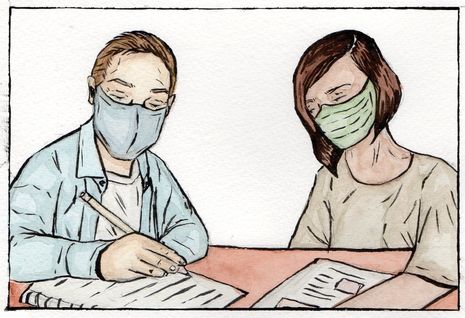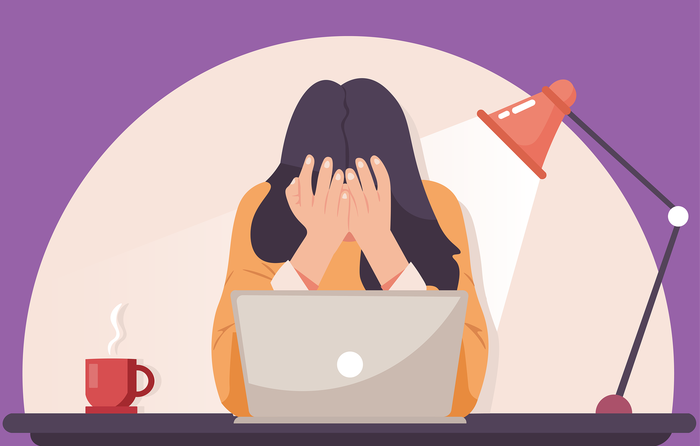Dear students, your anger is valid
Katie Chambers reflects on the experience of students, and argues that outrage and frustration in response to this mistreatment is justified.

Content Note: Brief mention of self-harm and suicide
In the noisy politics and Covid-19 briefings since March 2020, students have been noticeably ignored. Boris Johnson’s announcement of the third lockdown on the 5th January didn’t mention them. Instead, ambiguous advice trickled down over the following weeks: some students are living in empty halls, others, whom the Master of Trinity College Cambridge labelled “the wonderful silent majority”, have faced months of lectures from their childhood bedrooms. Even the roadmap out of lockdown announced in February did not mention universities; answers for students about when they can return to their paid accommodation have been subordinated to the reopening of theme parks and zoos.
When the government has addressed students, they have been microaggressive. Aside from banning schools from using material if they have been made by a group who doesn’t support capitalism, Gavin Williamson’s educational statement of 2020 was to lament a “chilling” crisis of “no-platforming” after Amber Rudd was disinvited from an event at Oxford University in the wake of the Windrush scandal. Williamson called the disinvitation “crazy’; Rees-Mogg called Oxford “snowflake central.”
Before it was weaponized by Trump and Piers Morgan, the term ‘snowflake’ appeared in Claire Fox’s 2016 book I Find That Offensive! referring to a student campaign at Yale University about cultural appropriation on Halloween. A snowflake has “a false sense of their own uniqueness, overly emotional and easily offended”, someone who has the audacity to object to the celebration of an architect of mass deportation, or protest the fencing off of their accommodation.
Students are not snowflakes, and never have been. This generation of students are angrier than ever, but more justified than ever in being so. Our anger is not disproportionate, and, crucially, it does not carry any false uniqueness. We have every right to be angry.
“Our anger is not disproportionate, and, crucially, it does not carry any false uniqueness.”
Student anger is not unjust. They have been victims of a mental health crisis in which their government and universities are complicit. Matt Hancock mandated that students return to campuses in September, then blamed them for increased cases, declaring it had “taken ministers by surprise”. Stigmatised by the government and the press, students began to be treated callously as antisocial disease vectors.
The most dehumanising moment came when Manchester University erected metal fencing around Fallowfield halls. Manchester insisted that an email had circulated informing students about it, only after backlash admitting its lie: the fences had gone up “ahead of the message being seen.”
Jesus College Cambridge informed students that they may not be exempt from disciplinary action when reporting a case of sexual assault in “incredibly serious aggravating circumstances” that violate the college’s covid-19 behavioural guidelines. These guidelines and those from other institutions, mandating social distancing from anyone outside your household, raised concerns that forms of sexual attack would inevitably put the victim in disciplinary and financial trouble.
Aware that their institutions had this sort of disregard for their wellbeing, students faced isolation in box rooms, outbreaks of covid-19, and severe mental distress. A survey by the National Union of Students found 30% of respondents had self-harmed and The Tab reported eight students taking their own lives on campus in eight weeks. And even in light of this, there were a few days when Matt Hancock refused to rule out locking students in halls indefinitely as the country veered towards Christmas.
Student anger is not entitled. The “snowflake” label is so insidious when applied to students because it preys on our youth, suggesting that our demands are naive, our anger is melodrama and student radicalism is just growing pains. I’ve read excerpts from emails from staff at the University of Cambridge accusing freshers of “winding each other up” and theorising that those applying to return on welfare grounds were simply not mature enough to understand the realities of a global health emergency. Students are not asking to be exceptionalised or pitied more than the rest of the population. They are merely asking to be treated like any other consumer who is entitled to a refund if they do not receive the experience they were promised. Not only is this a just request, but, quite frankly, exactly what the Conservatives should have expected when they marketised university education.
“The “snowflake” label is so insidious when applied to students because it preys on our youth, suggesting that our demands are naive, our anger is melodrama and student radicalism is just growing pains.”
But the government have nonetheless refused to reduce university fees. Worse, this refusal is based on gaslighting. The government has justified securing the usual £9k per student by merrily insisting that online or hybrid teaching is the same quality of education as normal. The scale and flagrancy of this lie is astonishing, and it assumes that students are naive. Even disregarding the fact that they have had to write essays amongst Covid infections and psychological distress, the realities of online learning are well known: incomplete lectures, compulsory reading that is unavailable or expensive online, and supervisions compromised by connectivity issues.
On Instagram, @nostudiostories shows rooms at the Glasgow School of Art where, unable to access necessary facilities, students have been forced to improvise makeshift studios, often without the space and circulation to handle chemicals safely. Yet professors as well as their students are put under immense pressure to keep up appearances. Students were hopeful that their grades might at least accommodate this lack of resources, but on the 7th January the Russell Group refused to grant a safety net for exams. Instead they told universities to “take individual circumstances into account”, assuming the majority of the cohort should by now be unfazed by a pandemic. In this debate about whether academic rigour can be achieved over Zoom, the fact that university fees also sponsor independence, joy, and lifelong friendships feels entirely forgotten.
To any student feeling that they have been done an injustice - you have, your anger is valid. In being angry, you are not oversensitive or immature. You are not asking for unique treatment - you’re actually asking to be treated like a normal consumer. In being angry, you’re not denying that in many ways students are lucky: unlikely to die from Covid, privileged with an education and money to pay for it. Students are pointing out that they are being treated with contempt by their government, and they are standing with the other demographics who are being treated the same or worse.
 News / Judge Business School advisor resigns over Epstein and Andrew links18 February 2026
News / Judge Business School advisor resigns over Epstein and Andrew links18 February 2026 News / Hundreds of Cambridge academics demand vote on fate of vet course20 February 2026
News / Hundreds of Cambridge academics demand vote on fate of vet course20 February 2026 News / Petition demands University reverse decision on vegan menu20 February 2026
News / Petition demands University reverse decision on vegan menu20 February 2026 News / CUCA members attend Reform rally in London20 February 2026
News / CUCA members attend Reform rally in London20 February 2026 News / Gov grants £36m to Cambridge supercomputer17 February 2026
News / Gov grants £36m to Cambridge supercomputer17 February 2026










